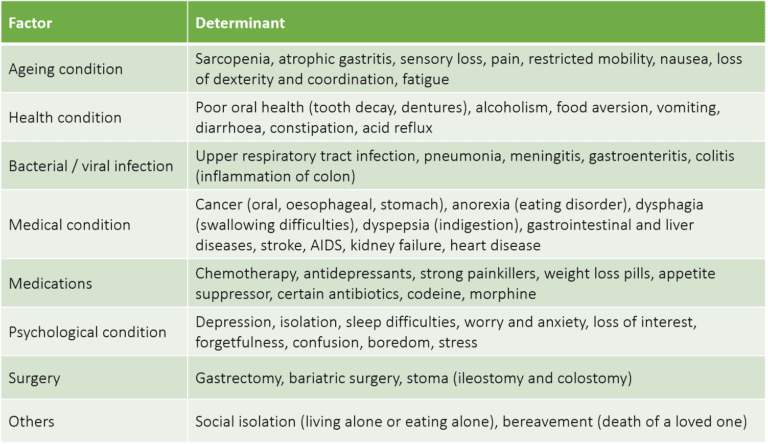Page Contents
Are you recently having poor appetite? Was it because the food you ate was tasteless or were you not feeling well? Have you been having this problem for quite some time? If it is true, you better take it seriously.
Consequences of prolonged poor appetite
Prolonged poor appetite can lead to many adverse health effects, for example:
- Malnutrition
- Overall poor health
- Drastic weight loss
- Compromised immune system
- Muscles weakness
- Impaired wound healing
- Impaired homeostasis
- Frailty and disability
What is causing your poor appetite?
Here are several reasons why you may have poor appetite.

What should you do now?
If you are unaware of the causes of your poor appetite, it is better to seek medical consultation. Doctor will schedule a health screening to analyse your blood compositions, biomarkers, infections, and possible diseases. In some cases, doctor may also order a scan, including ultrasound scan, X-ray, or CT scan.
To help you improve your nutrient intake, you may be referred to a dietitian for meal planning and symptom management. Sometimes, when there isn’t any suitable diagnosis, seeing a psychiatrist may help to understand the psychological stimulants that lead to your situation.
How to improve your appetite?
Some self-help options you can try out to improve your appetite.- Colour: Adding natural colours in your meal can stimulate your appetite.
- Aroma: Savoury aroma can improve your appetite by inducing salivation and releasing the gastric acid and insulin for digestion.
- Taste: Have a variety of tastes in your dishes, for example, sweet, bitter, salty, sour, and umami (meaty taste). Many Asians like spicy food too.
- Texture: Prepare your meals in mixed textures (watery, firm, crunchy, creamy, chewy).
- Variety: Balanced meal in healthy plate includes carbohydrates, fruits and vegetables, protein, dairy and healthy fats.
- Plating: A good presentation of food can enhance the overall dining experience.
- Serving size: Serving a variety of foods in smaller portion can help to satisfy your appetite.
- Frequency: Increase the dining frequency of smaller serving also helps to improve your appetite.
- Ambient: Have some soft music, a stalk of flower, warm lighting can elevate your dining experience.
There is an emerging science on gastrophysics that aims to study those factors that influence your multisensory experience while tasting food and drink.
Many of the examples above are covered in the book written by Professor Charles Spence. If you are interested to read on, you can find the book here or in your local library.


Conclusion
Loss of appetite can be a serious and life-threatening problem if left untreated. Whether you or someone you know has poor appetite that lasts more than a few days, don’t delay to seek medical assistance.
